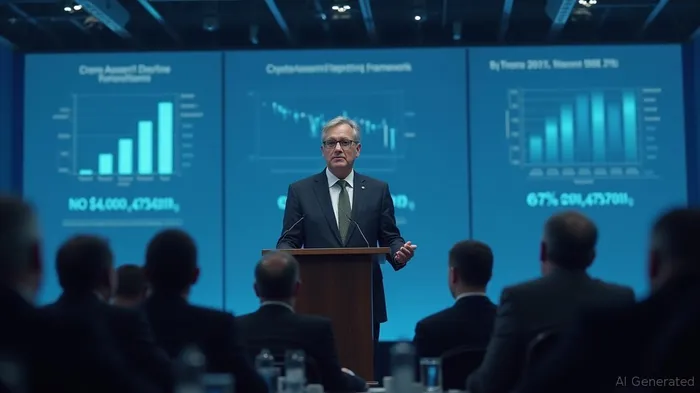OECD's Crypto-Asset Reporting Framework to Regulate 95% of Transactions by 2027
The Organisation for Economic Co-operation and Development (OECD) has formalized the Crypto-Asset Reporting Framework (CARF) to regulate crypto exchanges and increase global tax transparency, effective from 2027. This framework aims to capture 95% of transaction value, aligning digital assets with worldwide tax standards and enhancing regulatory oversight. The implementation of CARF signifies a major shift in global crypto compliance, closing tax information gaps in the crypto space. Entities such as CoinbaseCOIN--, Binance, and Kraken are impacted, moving to align with new reporting obligations. The US Treasury and IRS are also drafting corresponding rules effective from 2025 to enhance compliance strategies.
The introduction of CARF requires major exchanges to adapt, leading to increased compliance costs and blockchain infrastructure investments. Some market participants see this as a step toward legitimizing the industry, fostering trust with regulators. Insights suggest CARF will funnel 95% of crypto transaction volumes under regulatory oversight. Despite its comprehensive reach, initial peer-to-peer transfers via self-custodial wallets may remain outside the regulatory framework. The CRS, a precursor focusing on traditional asset reporting, provides a blueprint for the CARF’s progressive approach in digital assets. This shift aligns with US FATCA requirements for overseas asset disclosure. Experts indicate the new regulations echo historical trends in pushing for transparency and compliance. As seen previously, these measures often correlate with market maturations, setting frameworks for the future of digital finance.
The implementation of the Capital Markets Regulatory Framework (CARF) has led to a significant tightening of crypto regulations, marking a pivotal shift in the oversight of digital assets. The regulatory framework mandates that all issued stablecoins must be backed 100% by highly liquid assets, ensuring that each virtual coin denominated in US dollars is fully supported by tangible reserves. This move is part of a broader effort to enhance transparency and stability within the crypto market, addressing concerns about the volatility and risk associated with digital currencies.
In the European Union, the updated Travel Rule has been extended to all crypto transfers, with no threshold for application. This stringent implementation is designed to combat money laundering and terrorist financing by requiring detailed information on the origin and destination of crypto transactions. The rule applies uniformly across the EU, reflecting a concerted effort to standardize regulatory practices and enhance oversight within the region.
Turkey has also taken decisive action to tighten its grip on the crypto sector. The Capital Markets Board (SPK) has blocked access to decentralized exchange PancakeSwap and 45 other crypto-related websites, citing unauthorized operations and compliance issues. This crackdown is part of a broader regulatory strategy aimed at formalizing and controlling digital assetDAAQ-- markets. The SPK has full authority over crypto asset service providers, enforcing standards and compliance requirements to ensure that all activities within the sector adhere to legal guidelines. Turkey's stance on crypto payments has been strict since the ban on their use for purchases in 2021, although residents are still permitted to buy, hold, and trade digital assets. The country has mandated that crypto users provide identifying information for transactions above a certain threshold, further tightening oversight and ensuring compliance with regulatory standards.
Globally, countries have also taken steps to block crypto-related websites, citing unauthorized operations and illicit transaction risks. These actions reflect a growing trend of regulatory scrutiny and control over the crypto sector, as governments seek to balance the benefits of digital assets with the need for financial stability and security. The implementation of CARF and similar regulatory frameworks is expected to continue shaping the future of crypto markets, with a focus on enhancing transparency, stability, and compliance.

Quickly understand the history and background of various well-known coins
Latest Articles
Stay ahead of the market.
Get curated U.S. market news, insights and key dates delivered to your inbox.

Comments
No comments yet